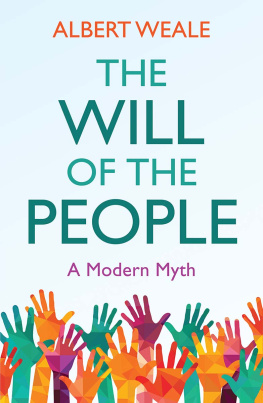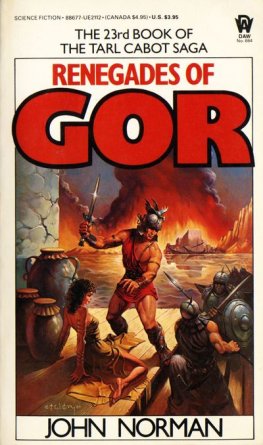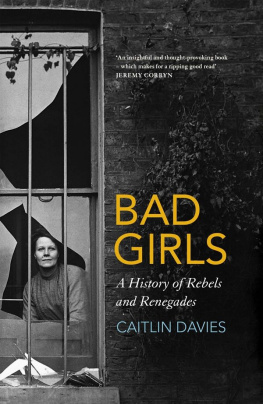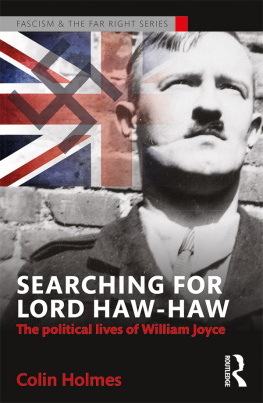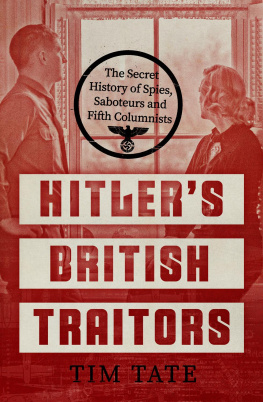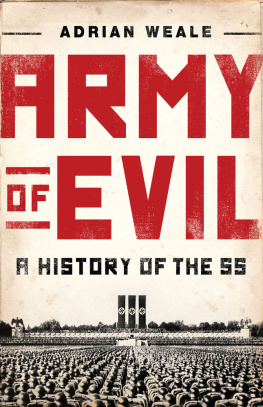Contents
About the Book
At the end of the Second World War, nearly 200 British citizens were under investigation for assisting Nazi Germany. Some have remained notorious, such as William Joyce (Lord Haw-Haw) and John Amery who went to the gallows for High Treason, but as this meticulously researched study shows, men like Joyce and Amery are only the visible part of a much larger and more intriguing story below the surface. Renegades is drawn entirely from original documentary material, eyewitness accounts and intelligence files. Adrian Weale traces the course of treason in the Second World War from its roots in Oswald Mosleys British Union of Fascists, through the war and subsequent investigations by MI5, up to the trial, imprisonment and in some cases execution of the traitors. Since Renegades was first published in 1994, many files previously restricted by privileged access have been released into the Public Records Office, and a number of other files, including several from MI5, have become available. Adrian Weale has revised his book, incorporating this new material, making Renegades a more comprehensive and authoritative study. Much here will be new to historians, including the first complete account of the British Free Corps the Waffen-SS unit composed entirely of British subjects and the identity of all its members, some of whom have been interviewed for this book. Also revealed is the extraordinary career of the conman who joined the Special Air Service and who, after capture by the Germans, informed on his POW camp comrades before volunteering to fight with the Waffen-SS on the Russian front; and in France, the story of the middle-aged British spinster who joined the Gestapo. Though regarded as highly dangerous at the time, German efforts to cultivate traitors in British ranks were for the most part stunningly unsuccessful not least, as this book reveals, because much of that effort was entrusted to a British Fascist turned double agent at work in the heart of the Third Reich.
About the Author
Adrian Weale read Philosophy at York University before going on to Sandhurst and several years with the British Army, mainly in Military Intelligence. He left the regular Army in 1991 and now lives in London. He has been researching the history of the British Free Corps since 1981.

Illustrations
Preface to the Pimlico edition
I started researching the history of the British renegades in the Second World War shortly after I left school in 1981. Having decided to take a year out before university, I felt that it would be an intellectually stimulating way to spend my time before resuming the academic rat-race. Fortified by youthful optimism and financed by a job as a tea-boy in the department of Chemical Engineering at Imperial College, I began visiting the Imperial War Museum library and the Public Records Office, trying to track down the few documents concerning the traitors which were then available to the public. In the snowy January of 1982, only 17 years old but tooled up with a letter of introduction from the Foreign Office and my German O level, I headed off by train to Berlin, still then under four-power occupation, to consult the records of the Berlin Document Center where, to my great delight, I found the personal files of several British members of the SS. But soon afterwards my project hit the brick wall of the British states obsessive secretiveness.
At the end of the Second World War, British detectives and intelligence officers began to scour Europe in search of evidence of treason. Witnesses were interviewed, suspects interrogated and documents seized. The result was a series of trials of civilians and servicemen implicated in the investigation. The trials and court-martials were, of course, public proceedings openly reported by the press, but as soon as they had finished, the records of them, including exhibits, witness statements and other materials, disappeared into the bowels of the British government archives, subject to extended periods of closure (seventy-five years in the case of the court-martial proceedings). The only worthwhile public records open in 1982 related to the trials of five members of the British Free Corps who had been civilians before joining it.
Ten years later I decided to try again. In the interim period, more documents relating to the renegades had begun to appear in the Public Records Office and pressure was building from journalists, historians and politicians for a rethink of the fundamentals of freedom of information in Britain. Having spent some time serving as a military intelligence officer, I now found myself being taken more seriously when I applied for access to records which were still closed, and I was duly granted privileged access to court-martial reports and other relevant files, which enabled me to finally complete the manuscript of Renegades.
Privileged access is, however, a double-edged sword. Amongst the stipulations regarding how such material may be used are clauses which prevent direct quotations and reference, which effectively turns the material into what journalists call background and robs it of much of its impact. Even so, this was the only way that the work could be completed, and I agreed to comply with the rules.
But in the seven years since the original publication of Renegades, there has been a significant about-turn in official policy on the release of records. All of the documents which I originally read under the restrictions of privileged access have been released into the Public Records Office, whilst a number of others, including many of the original files of the Security Service (MI5) have also been released. In consequence, the opportunity arose to produce a new edition of my book incorporating this newly released material which would, in my view, be considerably more comprehensive and authoritative than had hitherto been possible.
I am therefore delighted to have been given this opportunity by Will Sulkin and Pimlico not only to reprint Renegades, but to revise the manuscript in the light of the new material and thus to fill in many of the lacunae in this fascinating episode.
Adrian Weale
Bromfield
Shropshire
June 2001
Introduction
By all accounts, the conduct of judicial executions in Britain in the twentieth century was dignified and humane at least in so far as it is possible to be humane when inflicting an act of extreme violence. At the appropriate hour normally nine oclock the executioner and his assistant would enter the condemned cell, where they would pinion the arms of their victim before leading him a few yards to the gallows. The scaffold itself was usually sited in the room next to the condemned cell, and when the prisoner entered, he would be led to a chalked T mark on the trapdoor, where the executioner would apply the noose to his victims neck with the knot (in reality a metal eye) positioned underneath the left ear, and cover his head with a white cloth bag. As the hangman applied the noose, his assistant strapped the prisoners ankles together and, when he had finished, the chief executioner pulled out a safety pin, pushed a lever and the prisoner fell a short distance and died instantly from a fracture dislocation of the spinal column and colossal concussion. On average the whole process, from the hangmen first entering the cell to the prisoner dying at the end of the rope, took no more than ten seconds; sometimes even less.
The last judicial executions took place in Britain in 1964, after which the death penalty was suspended and then abolished for the crime of murder. However, the death penalty for treason was not abolished until 1998. At Wandsworth prison in south London, a fully operational gallows remained in existence in case a conviction was achieved. The last treason trials in Britain were held in the autumn of 1945, following which three men William Joyce, John Amery and Theodor Schurch went to the gallows. Since then it was recognized that the charge of high treason, and the compulsory death penalty that it carried on conviction, were too blunt an instrument to deal with the complex motives of those who betray their country, and, to all intents and purposes, it fell into abeyance until it was finally abolished.
Next page

